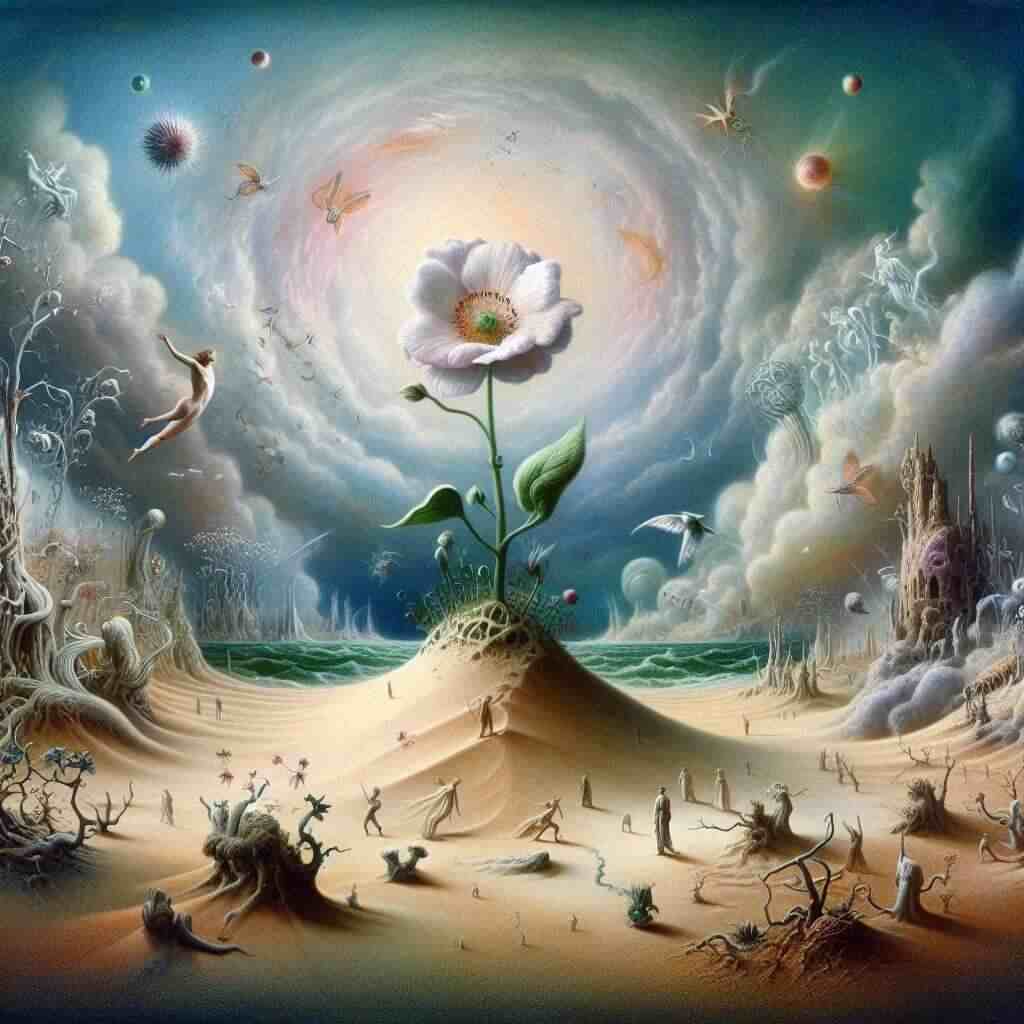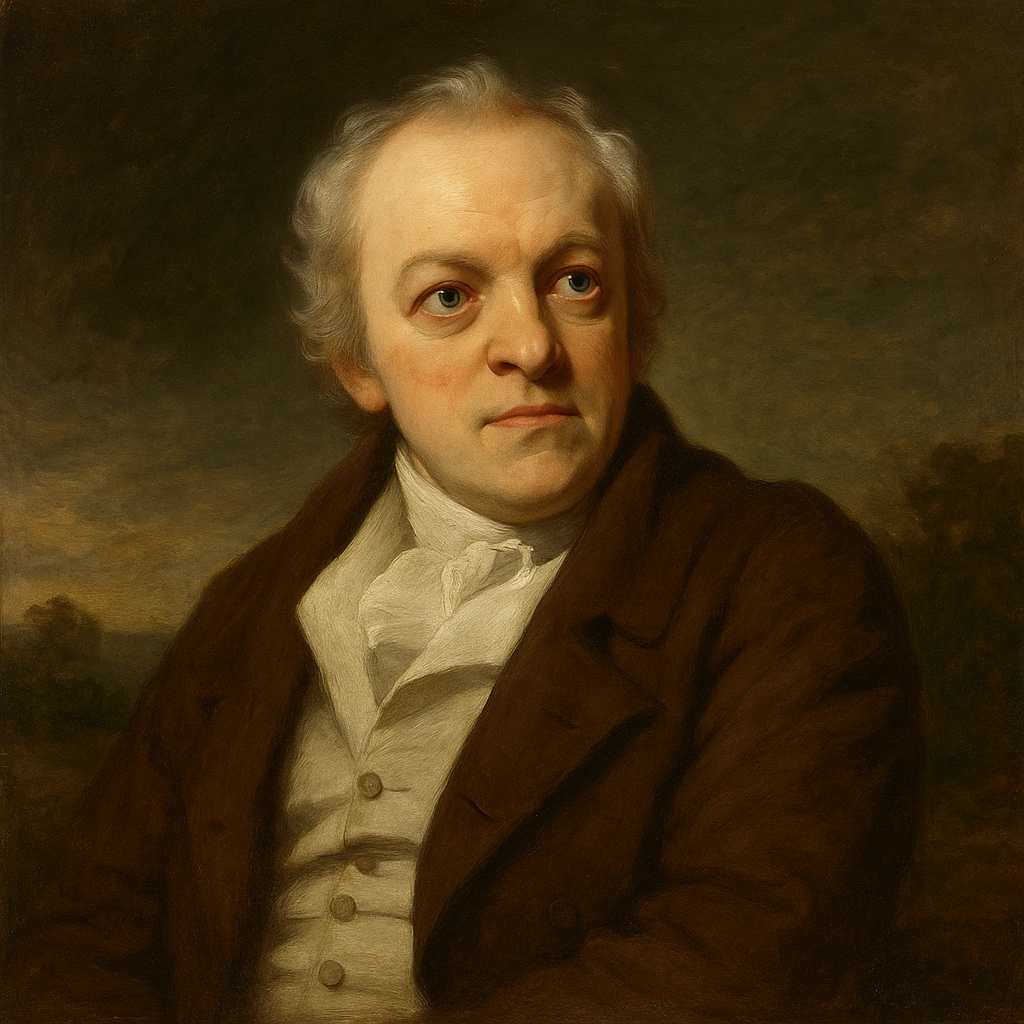Auguries of Innocence
William Blake
1757 to 1827

To see a World in a Grain of Sand
And a Heaven in a Wild Flower
Hold Infinity in the palm of your hand
And Eternity in an hour
A Robin Red breast in a Cage
Puts all Heaven in a Rage
A Dove house filld with Doves & Pigeons
Shudders Hell thr' all its regions
A dog starvd at his Masters Gate
Predicts the ruin of the State
A Horse misusd upon the Road
Calls to Heaven for Human blood
Each outcry of the hunted Hare
A fibre from the Brain does tear
A Skylark wounded in the wing
A Cherubim does cease to sing
The Game Cock clipd & armd for fight
Does the Rising Sun affright
Every Wolfs & Lions howl
Raises from Hell a Human Soul
The wild deer, wandring here & there
Keeps the Human Soul from Care
The Lamb misusd breeds Public Strife
And yet forgives the Butchers knife
The Bat that flits at close of Eve
Has left the Brain that wont Believe
The Owl that calls upon the Night
Speaks the Unbelievers fright
He who shall hurt the little Wren
Shall never be belovd by Men
He who the Ox to wrath has movd
Shall never be by Woman lovd
The wanton Boy that kills the Fly
Shall feel the Spiders enmity
He who torments the Chafers Sprite
Weaves a Bower in endless Night
The Catterpiller on the Leaf
Repeats to thee thy Mothers grief
Kill not the Moth nor Butterfly
For the Last Judgment draweth nigh
He who shall train the Horse to War
Shall never pass the Polar Bar
The Beggars Dog & Widows Cat
Feed them & thou wilt grow fat
The Gnat that sings his Summers Song
Poison gets from Slanders tongue
The poison of the Snake & Newt
Is the sweat of Envys Foot
The poison of the Honey Bee
Is the Artists Jealousy
The Princes Robes & Beggars Rags
Are Toadstools on the Misers Bags
A Truth thats told with bad intent
Beats all the Lies you can invent
It is right it should be so
Man was made for Joy & Woe
And when this we rightly know
Thro the World we safely go
Joy & Woe are woven fine
A Clothing for the soul divine
Under every grief & pine
Runs a joy with silken twine
The Babe is more than swadling Bands
Throughout all these Human Lands
Tools were made & Born were hands
Every Farmer Understands
Every Tear from Every Eye
Becomes a Babe in Eternity
This is caught by Females bright
And returnd to its own delight
The Bleat the Bark Bellow & Roar
Are Waves that Beat on Heavens Shore
The Babe that weeps the Rod beneath
Writes Revenge in realms of Death
The Beggars Rags fluttering in Air
Does to Rags the Heavens tear
The Soldier armd with Sword & Gun
Palsied strikes the Summers Sun
The poor Mans Farthing is worth more
Than all the Gold on Africs Shore
One Mite wrung from the Labrers hands
Shall buy & sell the Misers Lands
Or if protected from on high
Does that whole Nation sell & buy
He who mocks the Infants Faith
Shall be mockd in Age & Death
He who shall teach the Child to Doubt
The rotting Grave shall neer get out
He who respects the Infants faith
Triumphs over Hell & Death
The Childs Toys & the Old Mans Reasons
Are the Fruits of the Two seasons
The Questioner who sits so sly
Shall never know how to Reply
He who replies to words of Doubt
Doth put the Light of Knowledge out
The Strongest Poison ever known
Came from Caesars Laurel Crown
Nought can Deform the Human Race
Like to the Armours iron brace
When Gold & Gems adorn the Plow
To peaceful Arts shall Envy Bow
A Riddle or the Crickets Cry
Is to Doubt a fit Reply
The Emmets Inch & Eagles Mile
Make Lame Philosophy to smile
He who Doubts from what he sees
Will neer Believe do what you Please
If the Sun & Moon should Doubt
Theyd immediately Go out
To be in a Passion you Good may Do
But no Good if a Passion is in you
The Whore & Gambler by the State
Licencd build that Nations Fate
The Harlots cry from Street to Street
Shall weave Old Englands winding Sheet
The Winners Shout the Losers Curse
Dance before dead Englands Hearse
Every Night & every Morn
Some to Misery are Born
Every Morn and every Night
Some are Born to sweet delight
Some are Born to sweet delight
Some are Born to Endless Night
We are led to Believe a Lie
When we see not Thro the Eye
Which was Born in a Night to perish in a Night
When the Soul Slept in Beams of Light
God Appears & God is Light
To those poor Souls who dwell in Night
But does a Human Form Display
To those who Dwell in Realms of day
William Blake's Auguries of Innocence
William Blake's "Auguries of Innocence" stands as a testament to the poet's visionary genius and his unique ability to weave together seemingly disparate threads of existence into a cosmic tapestry of interconnectedness. This lengthy poem, composed of 132 lines of rhyming couplets, defies easy categorization and resists reductive interpretation. Instead, it invites readers into a labyrinthine exploration of Blake's mystical worldview, where the mundane and the divine, the infinitesimal and the infinite, are inextricably linked in a dance of eternal significance.
The poem's opening quatrain serves as both an invocation and a manifesto, setting the stage for the kaleidoscopic series of images and propositions that follow:
"To see a World in a Grain of Sand
And a Heaven in a Wild Flower
Hold Infinity in the palm of your hand
And Eternity in an hour"
These lines encapsulate Blake's fundamental belief in the interconnectedness of all things and the presence of the divine in even the most minute aspects of creation. The juxtaposition of the cosmic and the microscopic—"World" and "Grain of Sand," "Heaven" and "Wild Flower"—establishes a pattern of paradoxical thinking that permeates the entire work. Blake challenges his readers to expand their perception, to recognize the profound in the prosaic, and to understand that true wisdom lies in the ability to perceive the infinite within the finite.
As the poem progresses, Blake employs a rhetorical structure that has puzzled and fascinated scholars for generations. The majority of the poem consists of couplets that present cause-and-effect relationships between seemingly unrelated events or actions. These couplets often take the form of what might be called "moral equations," where an action in the natural world is linked to a consequence in the spiritual realm:
"A Robin Red breast in a Cage
Puts all Heaven in a Rage"
"A dog starvd at his Masters Gate
Predicts the ruin of the State"
These couplets serve multiple functions within the poem. On a surface level, they present a series of moral injunctions, warning against cruelty to animals and neglect of one's responsibilities. However, their significance extends far beyond simple moralizing. Blake is constructing an intricate web of correspondences between the physical and spiritual worlds, suggesting that every action, no matter how small, has cosmic repercussions.
This idea of cosmic interconnectedness is further reinforced by the poem's structure. The couplets, while individually discrete, build upon one another to create a cumulative effect. Each pair of lines adds another thread to Blake's tapestry, gradually revealing a universe where boundaries between categories—human and animal, physical and spiritual, temporal and eternal—are permeable and ultimately illusory.
Blake's use of animal imagery throughout the poem is particularly noteworthy. From the caged robin to the "Game Cock clipd & armd for fight," animals serve as both literal subjects and metaphorical vehicles for Blake's ideas. The poet's empathy for the suffering of animals is evident, but these creatures also function as symbols of innocence, purity, and natural wisdom. In Blake's cosmology, animals are not separate from or inferior to humans but are integral parts of the divine creation, possessing their own forms of consciousness and spiritual significance.
The poem's treatment of religious themes is characteristically Blakean in its unorthodoxy. While Christian imagery and concepts are present—references to Heaven, Hell, and the Last Judgment abound—Blake's vision transcends traditional Christian doctrine. His God is not the distant, judgmental deity of orthodox Christianity but a immanent presence manifested in all aspects of creation. This pantheistic streak is evident in lines such as:
"God Appears & God is Light
To those poor Souls who dwell in Night
But does a Human Form Display
To those who Dwell in Realms of day"
Here, Blake suggests that divine revelation is not limited to a single form or tradition but adapts to the spiritual state of the perceiver. This inclusivity and flexibility in matters of faith is characteristic of Blake's idiosyncratic spirituality, which drew from various sources including Christianity, Neoplatonism, and esoteric traditions.
The poem's engagement with social and political issues is subtle but profound. Blake's concern for the oppressed and marginalized is evident in lines that decry the mistreatment of animals, the exploitation of workers, and the corruption of the powerful:
"The poor Mans Farthing is worth more
Than all the Gold on Africs Shore
One Mite wrung from the Laborers hands
Shall buy & sell the miser's Lands"
These couplets reflect Blake's lifelong commitment to social justice and his critique of the economic and political systems of his time. However, true to the poem's visionary nature, these social observations are integrated into a larger spiritual framework, suggesting that earthly injustices have cosmic implications.
The poem's conclusion returns to the theme of paradox and the union of opposites that was introduced in the opening quatrain:
"Every Night & every Morn
Some to Misery are Born
Every Morn and every Night
Some are Born to sweet delight
Some are Born to sweet delight
Some are Born to Endless Night"
These lines encapsulate Blake's understanding of the dualistic nature of human existence. Joy and sorrow, light and darkness, are presented not as mutually exclusive opposites but as complementary aspects of a unified whole. This acceptance of life's inherent contradictions is central to Blake's philosophy and poetics.
"Auguries of Innocence" resists easy interpretation or categorization. It is at once a mystical vision, a moral treatise, a social critique, and a celebration of the power of perception. Its form—a series of seemingly disconnected couplets that gradually build to create a cohesive whole—mirrors its content, embodying the very interconnectedness it seeks to describe.
In conclusion, "Auguries of Innocence" stands as one of William Blake's most complex and rewarding works. It challenges readers to expand their perception, to recognize the profound connections that unite all aspects of existence, and to see the world with the visionary clarity that Blake himself possessed. In its intricate weaving of the cosmic and the mundane, the spiritual and the social, it offers a poetic experience that continues to resonate with readers, inviting us to see, in Blake's words, "a World in a Grain of Sand."
This text was generated by AI and is for reference only. Learn more
Want to join the discussion? Reopen or create a unique username to comment. No personal details required!



Comments
No comments yet. Be the first to comment!